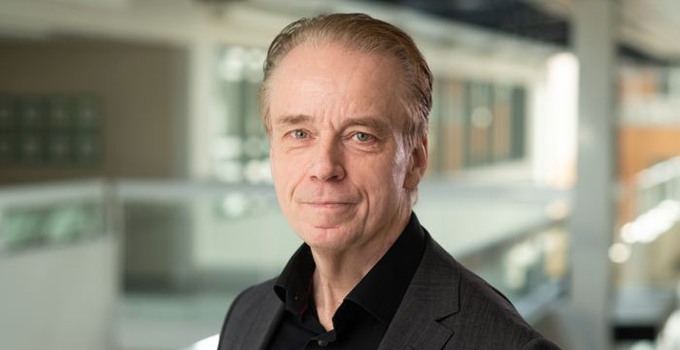
Michael Ekenstedt är adjungerad professor vid Institutionen för försvarssystem, Försvarshögskolan. Professuren finansieras av KK-stiftelsen under tre år (2020-2023).
Challenge in achieving profitability in innovation work
Michael Ekenstedt is an adjunct professor at the Department of Systems Science for Defence and Security. This means he splits his time between strategy and business development at Saab Dynamics and research on the governance of capability and technology development at the Swedish Defence University.
"The reason I'm here is that we at Saab realized that we needed to get a better understanding of customer needs," he says.
In developing new products, there are two main processes: the innovation process, which is about identifying what to develop, and the realization process, which is about how to develop the product.
"Traditionally, the industry has focused on the realization process because you can control the factors that influence it. The focus of our research is the innovation process – how the Swedish Armed Forces and defense industry can get better at identifying which capabilities and technologies should be developed to meet new needs," he explains.
Developing new defense materials often takes a long time and costs a lot of money, and there is therefore a significant interest from the industry to better understand the different phases in the Armed Forces' material procurement.
"It's very difficult to achieve profitability in developing new products. Generally, across the entire industry, only one in seven products is successful, and 35 percent of new products fail at the launch stages, which is why there's a big drive within the industry to improve these figures."
Methodology for capability development
Michael Ekenstedt's research primarily focuses on how the governance of capability and technology development can be improved, analyzing initially how the Armed Forces conduct their capability development. The goal is to develop a general methodology that can be used by both the Armed Forces and the industry, acting as an interpreter between the Armed Forces and the defense industry.
"The Armed Forces are very good at identifying capability needs but less proficient at translating these needs into what the industry requires, like details around specific technical characteristics and performance, while it's the opposite within the industry."
Mapping the Swedish Armed Forces' decision-making process for material procurement
So far, the concrete work has involved developing a value chain, describing the different parts of the Armed Forces' decision-making process, from the government's defense decisions to the actual orders for new materials.
"I look at the methodology they use to justify their material decisions, how the process looks from objective to strategy, and what decisions they then make."
He is currently in the final phase of the work and plans to continue with a similar analysis of the industry's value chain.
"The value chain looks different, but we believe that many of the challenges are located at roughly the same points in the value chains."
He is aware that the Armed Forces' decisions regarding material purchases are not only a consequence of a methodology but are also partly based on political decisions and considerations.
"Then there's also internal politics and different wills, but what we aim to do is to make the decision-making process clear."
Long experience in the defence industry
Michael Ekenstedt has over 25 years of experience in various positions within the defense industry. He earned his doctorate in solid-state physics at the University of Gothenburg and Chalmers University of Technology in 1993. After two years as a postdoc at Nippon Telegraph and Telephone Company's Basic Research outside Tokyo and a brief period at Chalmers, he started working in the defense industry, first at Celsius Bofors Weapon Systems and eventually at Saab Dynamics.
"I have always been interested in defense-related issues, and working for Saab or another defense-related activity I see as working with something that benefits societal security."
Differences in working methods within industry and academia
What is it like to work in academia compared to industry?
"I think it's quite good, but there are differences. At Saab, I specialize in negotiation work and often sit with teams of lawyers and people with commercial and technical backgrounds. Here we work in much smaller groups."
He also points out differences in methodology and the aspect of time in the work.
"In industry, we are very results-oriented and often go for quick solutions, whereas in academia, we are more problem-oriented and long-term."
Basis for further research in operations analysis
That the research in the governance of capability and technology development is largely uncharted territory also presents challenges. There are plans to establish the field with a focus on operations analysis as a new research area at the department and to build an environment with several researchers.
"My task here is also to create a basis on which we can build further. I am quite convinced that the work will continue in some form even after these three years."
Josefin Svensson
In brief
Title: Adjunct Professor of Systems Science for Defence and Security.
At FHS since: 1 November 2020.
Currently: "I have just submitted a manuscript that is a description of the value chain at the Armed Forces to a scientific journal. Hopefully, it will result in a publication in the future."
When I'm off: "I spend time with my family, work in the garden during the summer, and like to go to the gym."
Last read book: Red Storm by Tom Clancy.
Happy to discuss: "I am politically active in the Christian Democrats and like to discuss defence policy and energy issues."
Hidden talent: "I know a lot about astronomy and cosmology. What I'm most interested in is what is called degenerate matter, i.e. neutron stars and white dwarfs."
My motivation as a researcher: "The main driving force is curiosity. I'm interested in understanding how the world works, and that's probably what drew me to physics in the first place."
More about
Systems Science for Defence and SecurityPage information
- Published:
- 2023-02-17
- Last updated:
- 2024-03-04
